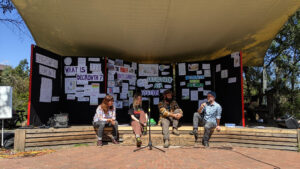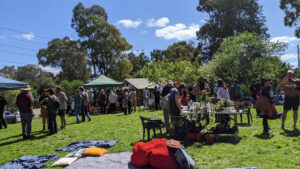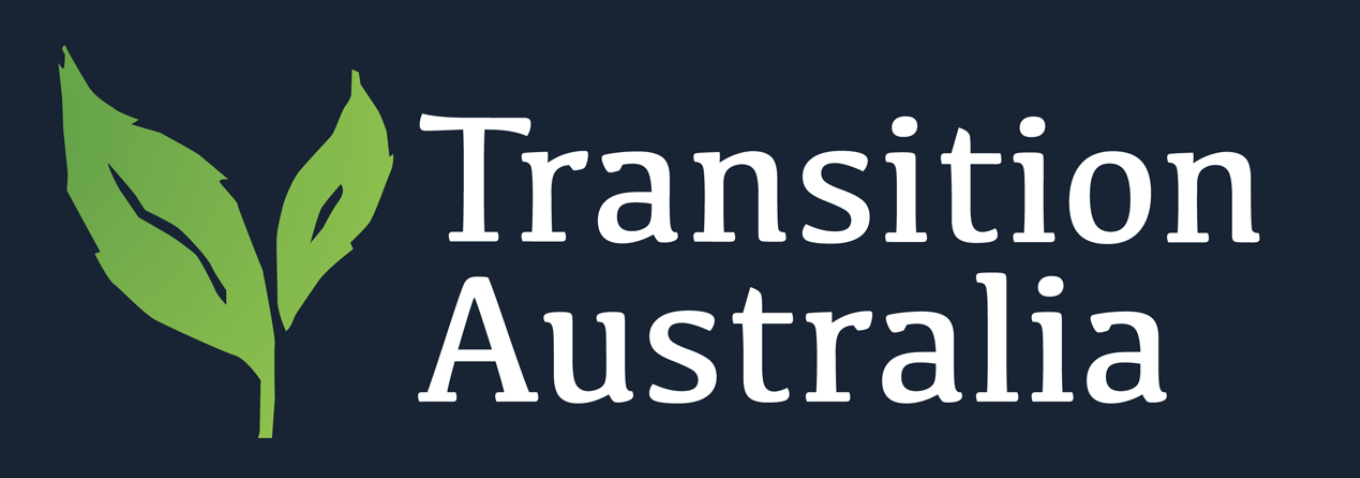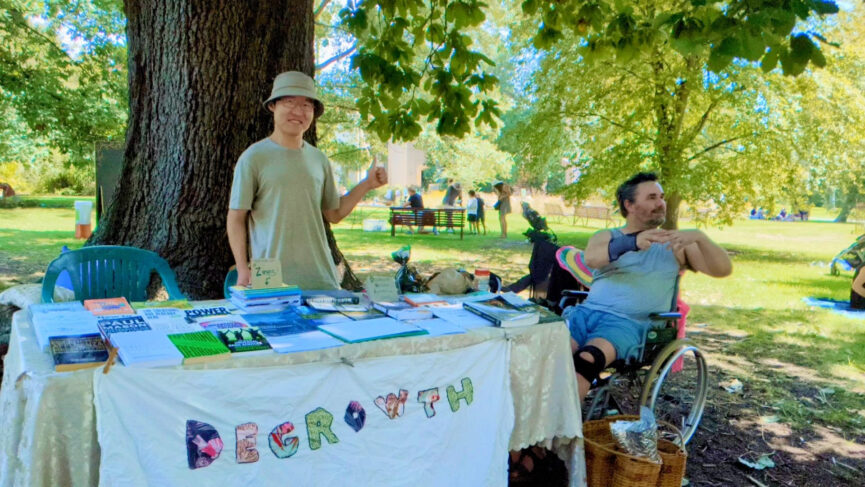Degrowth may be a new word for some, but it is an idea that has been around for a long time, in different forms with different names. Simply, degrowth says that economies that are consuming and producing beyond planetary boundaries need to consume less – ie de-grow the amount of materials and energy used or turned into waste (known as throughput).
Instead, we as communities and societies should redistribute and share material goods to provide a good life for all.
Places like Australia should consume less overall, to make room for those around the world who need more basic materials to meet their needs. Degrowth is a concept that is particularly useful for those of us in the Global North, as it is direct and difficult to co-opt, unlike words like sustainable and green, which many corporations have used to greenwash their activities.

Degrowth Festival at Ceres, Melbourne 2023. Photo: Jess
While degrowth is a useful term for those of us who see the reality that in order to avoid climate and ecological collapse/catastrophe we do need to consume less, that doesn’t mean it is strategic to use it in all conversations. Unfortunately we still live in a society that equates economic growth with quality of life, and when we use a word like degrowth that questions and critiques that idea, people can get defensive very quickly. Depending on the audience, it can be useful to explain the concept without using the word. Explain that economic growth is heavily correlated with growth of material throughput and therefore environmental damage, and that past a certain threshold of material goods (which most Australians have), more stuff is unlikely to make us more happy, and in fact inequality, overworking and individualism can make our lives worse. Instead, projects of sharing, such as share-housing or co-housing, tool libraries, community gardens, repair cafes, permaculture and so much more can be healthier for both people and planet.

photo credit: Ninna, taken at the Degrowth Festival at Ceres, Melbourne 2023
The degrowth literature and movement is huge. The term was first coined in France in the 1970s, and there have been thousands of articles, projects, workshops and conferences since then. Check out https://explore.degrowth.net/ to find lots of accessible resources on what degrowth is, and https://degrowth.info/ for an updated blog on degrowth projects worldwide.
People in the degrowth movement are driven by trying to find ways for humans to live truly sustainably on the earth while overcoming issues such as inequality and prejudice.
The issues we face are complex and have many different parts, and to arrive at better ways of making change and building sustainable communities we need to both discuss and practice; staying humble, being critical and respectful, and working hard.
In Australia there have been academics writing about degrowth for decades, including Samuel Alexander, Anitra Nelson and Terry Leahy. About 3 years ago some of us decided it was important to have a physical space where people could go to network about degrowth, especially to discuss strategy for bigger picture change beyond immediate single issue campaigns. So we created the Degrowth Network Australia.
For me, it was important to have a space to talk about environmental and climate destruction holistically, as I found a lot of the climate spaces I was involved in were focused on stopping fossil fuels and/or building renewable energy, without unpacking what the energy was being used for, and if we were inadvertently supporting an economy and political system driven in large part by competition for profit that was at the core of the destruction.
The Degrowth Network has monthly online gatherings where anyone interested in degrowth is welcome to come along, where they can discuss ideas and support each other to organise events and projects. We also have a local group on Kulin Country in Melbourne that meets monthly, as well as local groups in Ballarat, Sydney and Central Victoria.

Degrowth Festival at Ceres in Melbourne 2023, Photo: Degrowth Network Australia
One of the most exciting things that the Degrowth Network organises is the Degrowth Festival, which happens near the end of the year in Melbourne. Sunday 7th December is the date of the 2025 festival. Each year we have dozens of stalls by different groups and individuals who are already practising different parts of degrowth, from local food systems, convivial technology* such as bicycles, lost trades and tool libraries, activist groups fighting to contain the damage from the ways our economy currently operates, social centres and much more. We also have talks explaining what is Degrowth and the strategies behind it, workshops from many of the groups attending, and of course music, dancing and food. Please get in touch to be a part of it!
Contact us at degrowthnetwork@proton.me for more information or to get involved in the Degrowth Network Australia and/or the Degrowth Festival.
*Convivial technology is a conceptual framework for technologies suitable for degrowth societies, emphasizing quality of life, social and ecological values, and the modest use of materials and energy to live within Earth’s limits.
Feature image photo credit: Sandy, Degrowth Network Australia
Anisa Rogers
Degrowth Network Australia
August 2025

